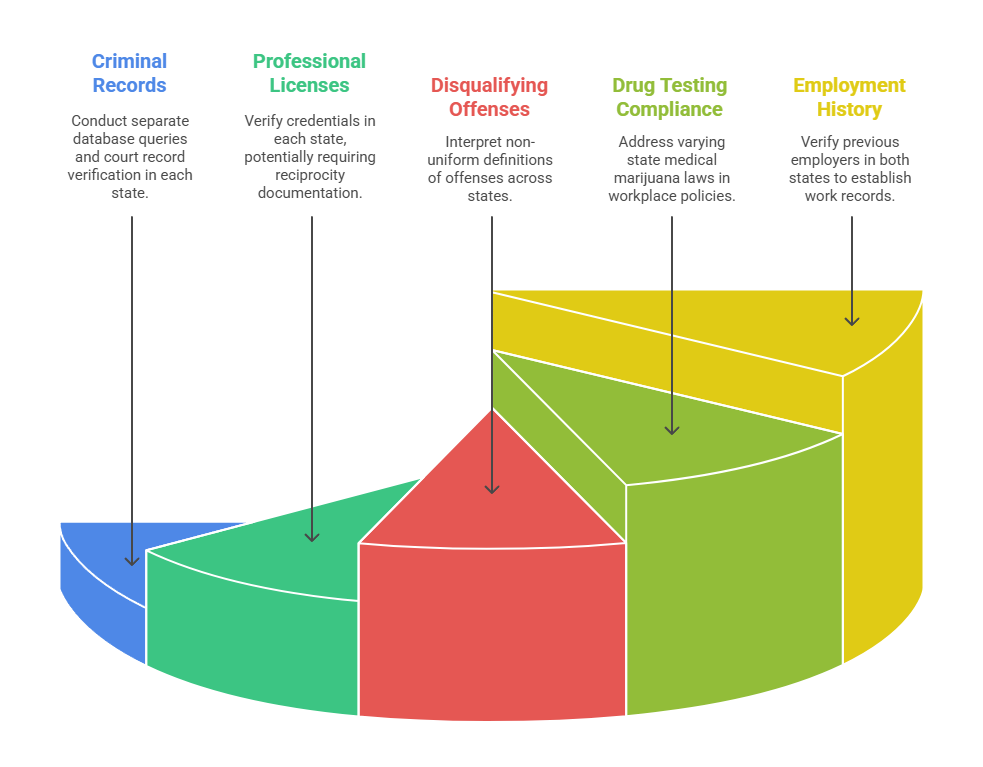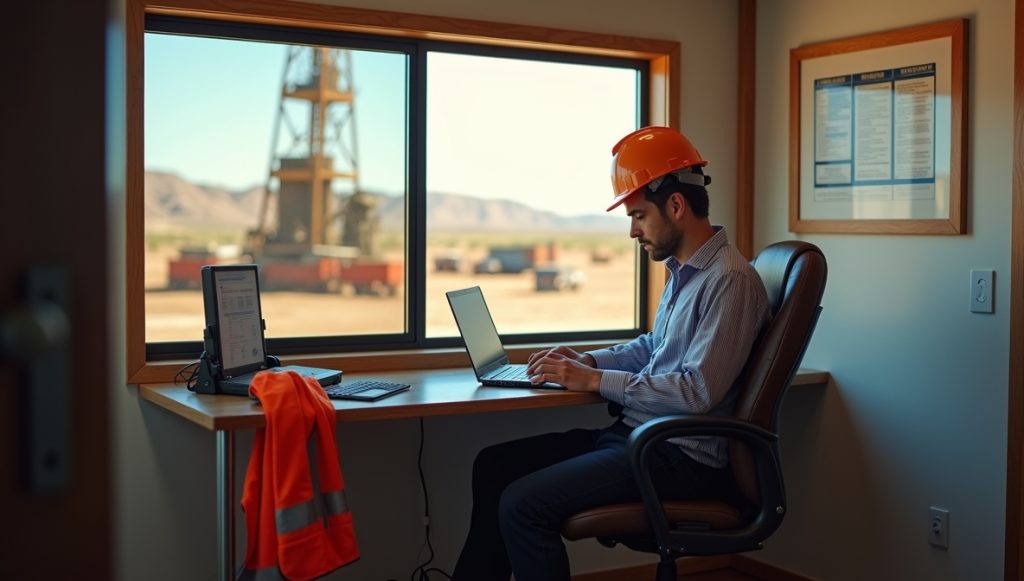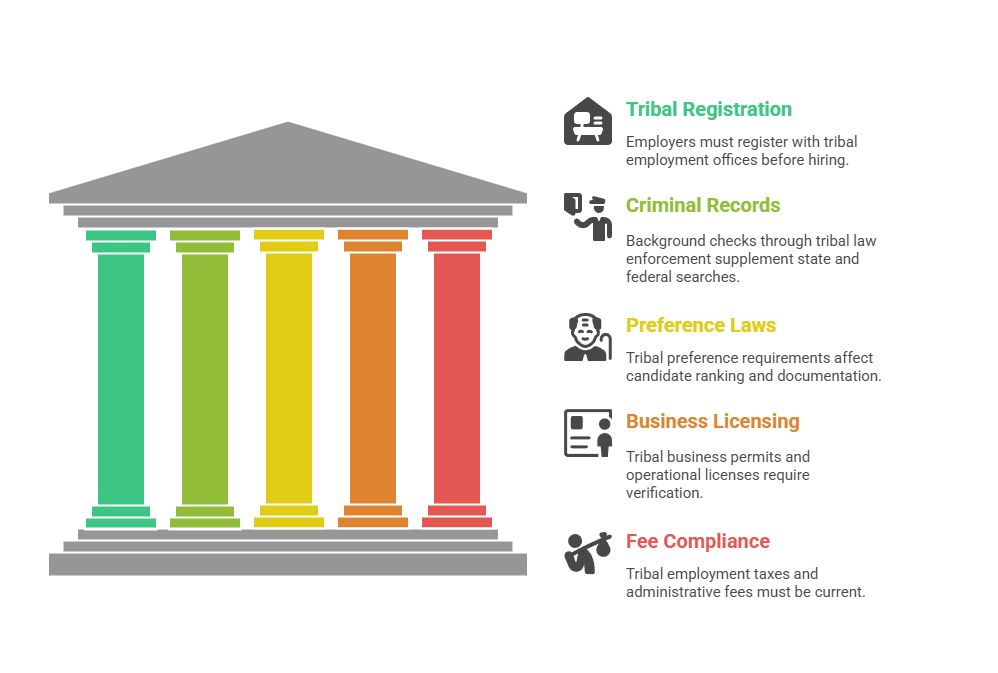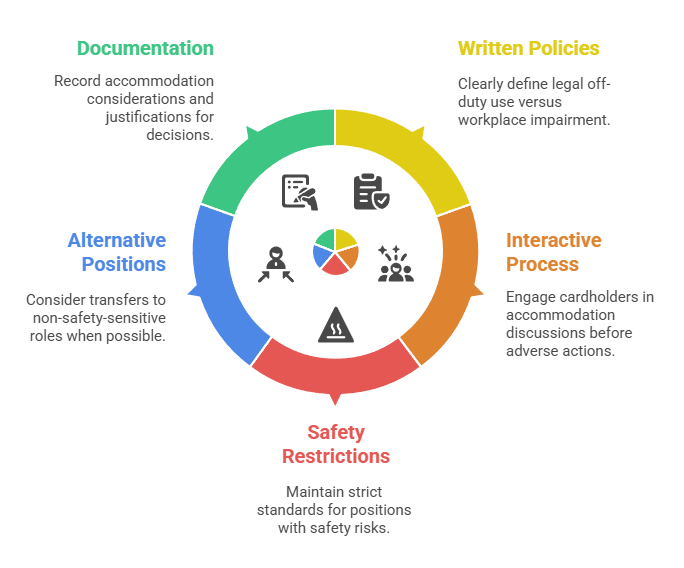New Mexico oil and gas background checks require navigating a complex tri-jurisdictional framework involving state regulations, federal PHMSA requirements, and tribal sovereignty laws that distinguish the state from other energy-producing regions. Companies operating across the Texas-New Mexico Permian Basin corridor must implement comprehensive employment screening protocols that address interstate workforce mobility while satisfying New Mexico Oil Conservation Division safety standards and tribal land employment requirements for efficient, legally compliant hiring operations.
Key Takeaways
- New Mexico oil and gas operators must comply with state, federal, and tribal regulations simultaneously, creating unique background check requirements not found in single-jurisdiction states.
- The Permian Basin's cross-border employment landscape requires screening processes that accommodate workers moving between Texas and New Mexico operations while maintaining compliance in both states.
- Pipeline worker screening requirements under PHMSA regulations mandate specific criminal background checks for employees in safety-sensitive positions across New Mexico's extensive pipeline infrastructure.
- Tribal land oil worker background screening follows sovereign nation protocols that may differ substantially from state and federal requirements, necessitating specialized knowledge for operations on reservation lands.
- New Mexico's stringent oil field safety regulations correlate directly with employment screening thoroughness, as the state enforces some of the nation's most comprehensive workplace safety standards.
- Energy sector background screening timelines in New Mexico average 5-7 business days for standard checks but can extend to 3-4 weeks when tribal jurisdictions or federal clearances are involved.
- Pre-employment drug testing requirements in New Mexico oil and gas operations exceed federal minimums, with many operators implementing hair follicle testing as standard protocol for field positions.
Understanding New Mexico's Unique Oil and Gas Employment Landscape
New Mexico's position as the nation's third-largest oil producer creates an employment environment unlike any other energy-producing state. The state's oil and gas sector employed over 104,000 workers in 2024, with projections indicating continued growth through 2025. This workforce expansion demands sophisticated background screening infrastructure capable of processing high volumes while maintaining compliance across multiple regulatory frameworks.
The state's tri-jurisdictional employment landscape creates complexity that catches many operators unprepared. New Mexico's 23 federally recognized tribes control approximately 7.9 million acres, including significant portions of energy-producing regions. Federal lands managed by the Bureau of Land Management constitute another 13 million acres, imposing additional screening requirements. State-regulated private and state trust lands complete this jurisdictional puzzle, requiring HR managers to determine applicable screening protocols based on operational geography.
The Permian Basin Cross-Border Employment Challenge
The Permian Basin's geological formation doesn't respect state boundaries, and neither does its workforce. An estimated 40% of workers in New Mexico's portion of the Permian Basin maintain residences in Texas, commuting across state lines or working rotational schedules that span both jurisdictions. This interstate employment mobility creates background check complications that single-state operators rarely encounter.
Texas and New Mexico maintain separate criminal record repositories and distinct professional licensing requirements. The following factors complicate cross-border screening:

- Criminal record searches: Each state requires separate database queries and court record verification processes
- Professional licenses: Credentials valid in Texas may require separate New Mexico verification or reciprocity documentation
- Disqualifying offenses: Non-uniform definitions between states create interpretation challenges for screening decisions
- Drug testing compliance: Different state medical marijuana laws affect workplace policies and accommodation requirements
- Employment history: Previous employers across both states require verification to establish comprehensive work records
Companies attempting to apply Texas-only screening protocols to New Mexico operations expose themselves to regulatory gaps. This oversight can result in hiring unqualified personnel or violating state-specific safety regulations.
New Mexico Oil Conservation Division Employment Requirements
The New Mexico Oil Conservation Division (OCD) enforces safety and environmental regulations that indirectly establish employment screening standards. While the OCD doesn't mandate specific background check components, its strict liability framework creates powerful incentives for thorough pre-employment screening. Companies face substantial penalties for incidents involving employees with undisclosed criminal histories related to safety violations.
The OCD's 2024 rule amendments strengthened operator accountability for contractor employee qualifications. This regulatory evolution means prime operators must verify that every worker on their sites meets qualification standards regardless of direct employment status. Safety compliance officers should document screening protocols as part of overall safety management systems, positioning background checks as essential preventive measures rather than mere administrative requirements.
Essential Components of New Mexico Oil and Gas Background Checks

Effective New Mexico oil and gas background checks extend beyond standard employment screening to address industry-specific risks. A baseline screening package should include seven-year criminal history searches at county, state, and federal levels. Additional components cover verification of professional licenses, employment history focused on safety-sensitive roles, and education credentials.
The energy sector background screening landscape has evolved significantly since 2020, with operators adopting enhanced measures. Contemporary best practices now include continuous monitoring programs that alert employers to post-hire criminal activity. These programs incorporate social security number validation to prevent identity fraud and specialized reference checks designed to uncover unreported safety incidents from previous employment.
Criminal Background Check Requirements and Look-Back Periods
New Mexico law permits employers to consider criminal history relevant to the position being filled but establishes important limitations. The state's "ban-the-box" provisions prohibit criminal history inquiries on initial employment applications for most positions. However, positions directly involved in safety-sensitive operations receive exemptions from these restrictions, allowing earlier screening.
| Screening Component | Standard Look-Back Period | Extended Period Justifications |
| Felony convictions | 7 years | 10 years for pipeline operations, hazardous materials, critical infrastructure access |
| Misdemeanor convictions | 7 years | Case-by-case based on safety-sensitive nature of position |
| Federal criminal records | 7 years | 10 years for positions requiring federal facility access |
| Sex offender registry | Lifetime | No limitation for positions near residential areas or involving minors |
Safety compliance officers should establish position-specific screening matrices that document justifiable look-back periods. These matrices should be based on job responsibilities and documented risk profiles to support employment decisions.
Industry-Specific Certifications and License Verifications
New Mexico requires specific certifications and licenses for numerous oil and gas positions. Well service operators, production equipment operators, and drilling personnel must hold valid credentials issued by recognized training organizations or state authorities. The proliferation of fraudulent training certificates affects an estimated 3-5% of credential presentations according to industry screening data.
Pipeline worker screening requirements include verification of Pipeline and Hazardous Materials Safety Administration Operator Qualification certifications. New Mexico's extensive pipeline infrastructure means thousands of workers require OQ verification as part of pre-employment screening. Operators must maintain updated OQ records and conduct periodic reverification, integrating these requirements into ongoing compliance monitoring systems.
Navigating Tribal Land Oil Worker Background Screening
Tribal land oil worker background screening represents one of New Mexico's most complex employment compliance challenges. The state's major energy-producing tribes—including the Navajo Nation, Jicarilla Apache Nation, and several Pueblo nations—maintain independent employment regulatory frameworks. Companies operating on tribal lands must establish screening protocols that satisfy tribal employment offices while maintaining consistency with enterprise-wide hiring standards.
The Navajo Nation covers portions of New Mexico's northwestern oil and gas region and maintains one of Indian Country's most comprehensive employment regulatory systems. Tribal sovereignty creates a unique compliance environment with specific documentation and verification requirements. Background screening for tribal land positions must include verification of tribal enrollment status, Navajo Nation criminal history checks obtained through tribal law enforcement, and documentation of compliance with tribal employment taxes.
Sovereignty Considerations in Employment Screening
Tribal sovereignty creates a dual regulatory environment where both tribal and state/federal employment laws may apply. Supreme Court decisions have consistently upheld tribal authority over employment relationships on reservation lands, even for non-Indian employees. This legal framework means background screening protocols for tribal land operations must incorporate tribal requirements as primary compliance obligations.
HR managers should establish direct relationships with tribal employment offices and law enforcement agencies. Key considerations include:

- Tribal registration: Employers must register with tribal employment offices before conducting regular hiring on reservation lands
- Tribal criminal records: Separate background checks through tribal law enforcement supplement state and federal searches
- Employment preference laws: Tribal preference requirements affect candidate ranking and documentation procedures
- Business licensing: Tribal business permits and operational licenses require verification for employer authorization
- Fee compliance: Tribal employment taxes and administrative fees must be current before hiring authorization
Companies attempting to apply standard state-based screening protocols without tribal coordination frequently encounter delays. These oversights result in incomplete information or outright rejections of employment applications, disrupting operational timelines.
Cultural Competency in Tribal Employment Processes
Beyond legal compliance, successful tribal land employment screening requires cultural competency. Many tribal employment offices prefer direct personal contact over electronic communications. Decision-making processes may involve tribal employment review boards that meet on schedules different from typical corporate timelines.
Employment screening questions that may be standard in non-tribal contexts can raise concerns in tribal employment settings. Questions about family relationships, community affiliations, or residence history may intersect with sensitive tribal membership issues. Screening protocols for tribal land operations should undergo review by tribal liaison officers or cultural advisors to ensure questions serve legitimate employment purposes.
Pipeline Worker Screening Requirements Under PHMSA Regulations
Pipeline worker screening requirements under PHMSA regulations establish federal minimum standards that New Mexico operators must meet or exceed. PHMSA's regulations under 49 CFR Part 199 mandate drug and alcohol testing programs for employees performing operations, maintenance, or emergency response functions. These requirements apply regardless of whether pipelines cross state boundaries, affecting gathering systems and intrastate transmission lines throughout New Mexico's oil and gas regions.
| PHMSA Requirement Category | Covered Positions | Screening Components |
| Operator Qualification (OQ) | Field technicians, maintenance personnel, operations supervisors | Competency verification, training documentation, criminal background checks |
| Drug & Alcohol Testing | All safety-sensitive positions | Pre-employment, random, post-accident, reasonable suspicion testing |
| Control Room Operations | Pipeline controllers, monitoring technicians | Enhanced background checks, psychological evaluations, fitness-for-duty assessments |
PHMSA's Operator Qualification rule emphasizes competency verification that extends beyond traditional background screening. While not explicitly requiring criminal background checks, the rule's focus on evaluating qualifications creates a regulatory foundation. Industry best practices treat criminal background checks as essential components of OQ compliance, particularly for evaluating factors that could impair reliable performance.
Safety-Sensitive Position Designations
Proper designation of safety-sensitive positions forms the foundation of compliant pipeline worker screening programs. PHMSA regulations define covered tasks as activities that could affect pipeline operational safety. In New Mexico's Permian Basin operations, safety-sensitive designations typically include field technicians, operations supervisors, maintenance personnel, control room operators, and emergency responders.
Safety compliance officers should maintain detailed position matrices that identify which roles qualify as safety-sensitive. This documentation serves multiple purposes: guiding appropriate background screening scope, supporting drug testing program designations, and providing evidence of regulatory compliance. Annual review of position designations ensures the classification system remains current as job responsibilities evolve and new positions are created.
Drug Testing Requirements for New Mexico Oil Field Workers
Drug testing requirements for New Mexico oil field workers exceed federal minimums, reflecting the industry's commitment to safety. While Department of Transportation regulations establish baseline drug testing requirements, many New Mexico operators implement more comprehensive programs. The state's oil and gas industry has increasingly adopted hair follicle testing as the preferred screening methodology, extending detection windows from days to months.
New Mexico law permits pre-employment, reasonable suspicion, post-accident, and random drug testing for safety-sensitive positions. However, employers must maintain documented drug-free workplace policies that clearly communicate testing circumstances. The state's medical cannabis program creates additional complexity, as employers must balance workplace safety concerns against qualified patients' legal use outside work hours.
Expanded Panel Testing in the Energy Sector
Standard five-panel drug tests remain common in many industries, but New Mexico oil and gas operators increasingly implement expanded panels. The opioid crisis has particularly impacted expanded testing adoption, as fentanyl and other synthetic opioids frequently evade detection in standard opiate panels. Hair follicle testing provides a 90-day detection window compared to the 2-7 day window for most substances in urine testing.
The methodology's higher cost—typically $125-200 per test versus $30-50 for urinalysis—is offset by reduced false negatives. Permian Basin operators report that hair follicle testing adoption has correlated with measurable reductions in workplace incidents and workers' compensation claims. This correlation supports the business case for enhanced screening despite higher per-test costs.
Medical Marijuana and Workplace Safety Balancing
New Mexico's medical cannabis program protects qualified patients from discrimination based solely on cardholder status. However, the law explicitly preserves employer rights to maintain drug-free workplaces and to discipline employees for workplace impairment. This framework requires employers to distinguish between off-duty medical cannabis use and workplace impairment.
Oil and gas operators should implement clear policies addressing medical cannabis that emphasize impairment-based standards. The following approaches help navigate this complex issue:

- Written policies: Clearly distinguish between legal off-duty use and prohibited workplace impairment or safety risks
- Interactive process: Engage qualified cardholders in reasonable accommodation discussions before adverse employment actions
- Safety-sensitive restrictions: Maintain strict standards for positions where impairment creates unacceptable safety risks
- Alternative positions: Consider transfers to non-safety-sensitive roles when available and appropriate
- Documentation requirements: Record all accommodation considerations and business justifications for employment decisions
Employers maintain strong legal footing to exclude individuals from safety-sensitive positions when marijuana use creates unacceptable safety risks. This protection applies even when use is legal under state medical cannabis laws and cannot be reasonably accommodated.
Compliance Best Practices and Legal Risk Management
Compliance best practices for New Mexico oil and gas background checks require systematic approaches addressing multiple regulatory frameworks simultaneously. The Fair Credit Reporting Act establishes federal minimum standards for employment background screening. These standards include disclosure requirements, written authorization procedures, pre-adverse action notices, and adverse action notices with prescribed timing. FCRA violations expose employers to statutory damages of $100-1,000 per violation plus actual damages and attorney fees.
New Mexico state law adds requirements beyond FCRA mandates, particularly regarding criminal history consideration. Employers must conduct individualized assessments before denying employment based on criminal history. Documentation of this individualized assessment process provides essential protection against discrimination claims while ensuring employment decisions reflect legitimate business concerns.
Creating Position-Specific Screening Matrices
Position-specific screening matrices establish clear, defensible criteria for background screening scope and disqualifying factors. Rather than applying uniform screening to all positions, matrices identify which screening components apply to each role. This tailored approach optimizes resource allocation while reducing legal risk from over-inclusive screening practices.
| Position Category | Criminal Check Scope | Drug Testing Method | Additional Requirements |
| Field operations (safety-sensitive) | 7-year felony/misdemeanor, federal records | Hair follicle + random urinalysis | OQ verification, MVR, employment history |
| Pipeline operations | 10-year felony, 7-year misdemeanor | Hair follicle + DOT random program | PHMSA compliance, continuous monitoring |
| Administrative/office | 7-year felony only | 5-panel urinalysis | Education verification, reference checks |
| CDL drivers | 7-year felony/misdemeanor, federal records | DOT 5-panel + random program | MVR continuous monitoring, medical certification |
Developing effective screening matrices requires cross-functional collaboration between HR, safety compliance, legal, and operational leadership. Subject matter experts should identify specific risks associated with each position category. Regular review and updates ensure matrices remain aligned with evolving job responsibilities and regulatory requirements.
Conclusion
New Mexico oil and gas background checks demand sophisticated approaches that address the state's unique tri-jurisdictional regulatory landscape. Companies operating in the energy sector must implement comprehensive screening protocols extending beyond standard employment verification. Strategic vendor selection, position-specific screening matrices, and robust compliance documentation systems transform background checks from administrative necessities into strategic tools. As New Mexico's oil and gas industry continues expanding through 2025, employment screening excellence will increasingly differentiate operators that attract top talent and maintain exemplary safety records.
Frequently Asked Questions
How long do background checks take for New Mexico oil and gas jobs?
Standard background checks for New Mexico oil and gas positions typically require 5-7 business days for completion. Comprehensive screening that includes tribal jurisdiction checks, federal criminal records, or extensive multi-state history can extend timelines to 3-4 weeks. Expedited processing options may be available for critical positions. Tribal jurisdiction components rarely accommodate acceleration due to sovereign nation administrative processes.
Do all New Mexico oil field workers need PHMSA clearance?
Not all oil field workers require PHMSA clearance, as regulations apply specifically to employees performing operations, maintenance, or emergency response functions on pipeline facilities. Workers exclusively involved in drilling, completion, or production operations that don't interface with pipeline systems fall outside PHMSA's regulatory scope. However, many New Mexico positions involve pipeline-related activities, making Operator Qualification verification common. Field personnel should expect PHMSA screening as standard protocol.
Can employers in New Mexico reject applicants with criminal records?
New Mexico employers may consider criminal history relevant to position requirements but must conduct individualized assessments first. Employers must evaluate the nature and gravity of offenses, time elapsed since conviction, and the relationship between criminal history and specific job duties. Categorical exclusions based on criminal record status violate state guidance and potentially expose employers to discrimination claims. Positions with specific statutory disqualifying offenses provide exceptions to individualized assessment requirements.
What drug testing method do most Permian Basin oil companies use?
Most major Permian Basin oil and gas operators have adopted hair follicle testing as their preferred pre-employment drug screening methodology. The 90-day detection window provides superior ability to identify patterns of substance use compared to urinalysis. Urinalysis remains common for post-accident and reasonable suspicion testing due to lower cost and faster results. Many companies implement hybrid approaches balancing comprehensive screening with operational efficiency.
Are background check requirements different on tribal lands?
Background check requirements on tribal lands include standard state and federal components plus additional tribal-specific elements. Tribal land operations typically require criminal history checks through tribal law enforcement agencies. Verification of compliance with tribal employment preference laws is mandatory. Documentation of required tribal business licenses and permits completes the screening process before employment authorization.
What certifications must be verified for New Mexico oil field positions?
Essential certifications vary by role but commonly include OSHA safety training certificates, H2S awareness certification, and confined space entry qualification. Pipeline positions require PHMSA Operator Qualification verification for covered tasks. Commercial driver's licenses must be verified for positions involving vehicle operation. Employers should establish position-specific certification matrices identifying required credentials for each role category.
How often should oil and gas companies re-screen employees?
Industry best practices recommend comprehensive re-screening every 3-5 years for all employees in safety-sensitive positions. Continuous monitoring programs should provide real-time alerts for criminal activity, license suspensions, or other relevant changes between scheduled cycles. Pipeline workers in PHMSA-regulated positions require Operator Qualification reverification at intervals not exceeding five years. Random drug testing should occur quarterly at minimum rates of 25% for DOT-regulated positions.
Do background checks differ for contractors versus direct employees?
Background check requirements should remain consistent for contractors and direct employees performing equivalent work. The 2024 New Mexico Oil Conservation Division rule amendments extended operator liability to contractor employees. Prime operators increasingly require contractors to implement screening protocols meeting or exceeding the operator's own standards. Service agreements should specify minimum background screening requirements and establish audit rights to verify contractor compliance.
Additional Resources
- New Mexico Oil Conservation Division - Rules and Regulations
https://www.emnrd.nm.gov/ocd/rules-and-regulations/ - Pipeline and Hazardous Materials Safety Administration - Operator Qualifications
https://www.phmsa.dot.gov/pipeline/operator-qualifications - Fair Credit Reporting Act - Employment Screening Requirements
https://www.ftc.gov/business-guidance/resources/using-consumer-reports-what-employers-need-know - New Mexico Department of Workforce Solutions - Labor Law Resources
https://www.dws.state.nm.us/Labor-Relations - Professional Background Screening Association - Industry Standards
https://www.pbsa.org/industry-standards
